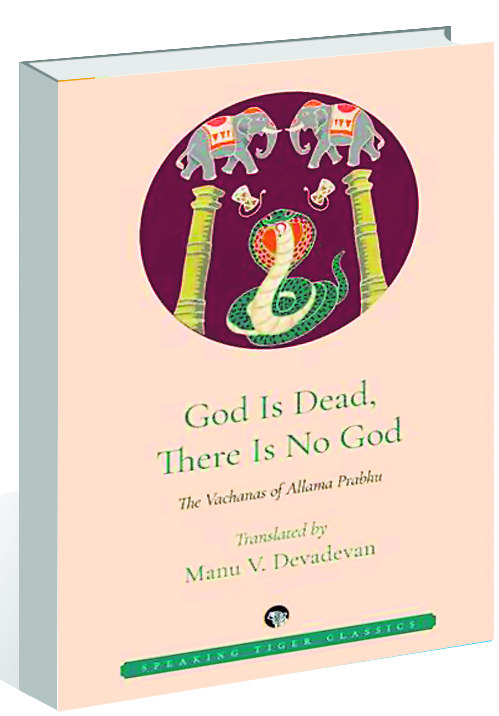God is Dead, There is No God: The Vachanas of Allama Prabhu Translated by Manu V. Devadevan. Speaking Tiger. Pages 299. Rs 499.
Book Title: God is Dead, There is No God: The Vachanas of Allama Prabhu
Author: Translated by Manu V. Devadevan
Harpreet Vohra
Manu V. Devadevan has made a bold attempt at translating the vachanas of 12th- century Kannada saint-poet of the Veerashaivas tradition, Allama Prabhu, into English in God is Dead, There is no God. He admits of his audaciousness at having undertaken the epic task even though with some trepidation. Because he had before him as touchstone, the iconic work by A.K. Ramanujan, Speaking of Siva. He, however, considers Ramanujan’s work as unsatisfactory for several reasons. Devadevan dives deep and translates to retain the cryptic-paradoxical tenor of Allama Prabhu’s powerful writing.
The title of the book, revolting in itself, captures the saint-poet as iconoclast. It expounds upon his unorthodox approach to an array of experience, ranging from banality of temporal negotiations to metaphysical conundrums inhering in the spiritual. The vachanas (or poems in free verse) have been thematically arranged to cover a series of concepts like the Mist of Maya, Birth and Death, Devotion and Worship, The Self, The Body, The World and God is Dead, there’s no God. Like a true Bhakti saint, Allama Prabhu preaches unfaltering devotion and disregard of rite and ritual. Allama Prabhu uses paradox and inversion to bring out enigmatic truths and all the vachanas end with a question, an invocation or a mischievous truth-telling addressed to Goggeshvara, one of the many honorifics given to Shiva.
The unorthodoxy of Allama Prabhu can be seen in most of the vachanas but the ones that are based on the title of the book God is Dead, There is No God, are particularly interesting with their caustic flavour and wicked innuendoes. These vachanas throw caution to the winds in the interpretation of God: the descriptions appearing almost blasphemous. Goddess Ganga becomes a “tonsured widow”, Vasudeva “ripped the skull apart”, the “God perished”, the goddess “went whoring” and Ganga and Gauri “became tonsured widows”. Common notions of reverence and sanctimony are so intelligently upended to present Goggeshvara as that formless one who needs no institutionalisation and true to the tenets of Veerashaivism, Goggeshvara needs no temple and his followers need no pilgrimage or tethering to kinship and inherited relationships.
Devadevan has dedicated his work of Allama Prabhu’s vachanas to MM Kalburgi, who had encouraged him to attempt this challenging task of translation which he felt could assault us with “flashes of understanding” that other modes of engagement were incapable of. True to Kalburgi’s desire, this translation does exactly that.














